AI and Academic Integrity
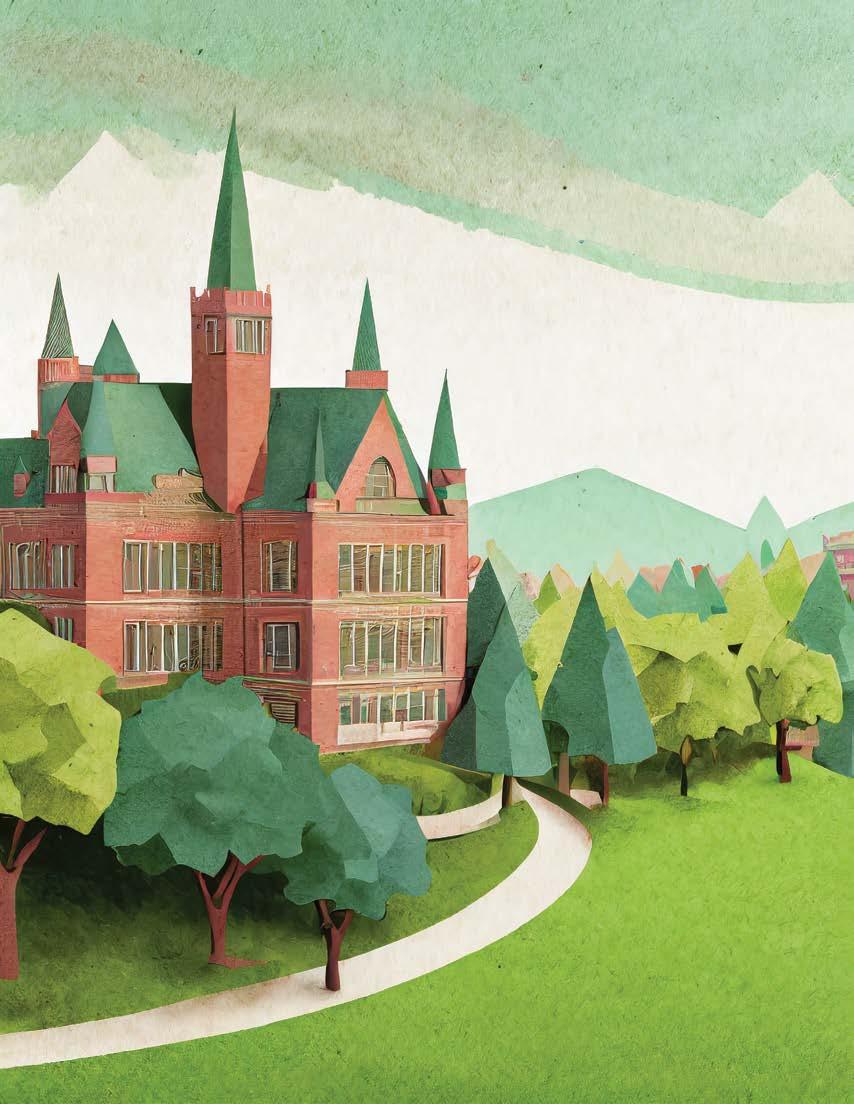
IN THIS ISSUE
Transforming Learning, Transforming Lives: The Levavi Oculos Strategic Plan
2022-23 Annual Report
2024
WINTER
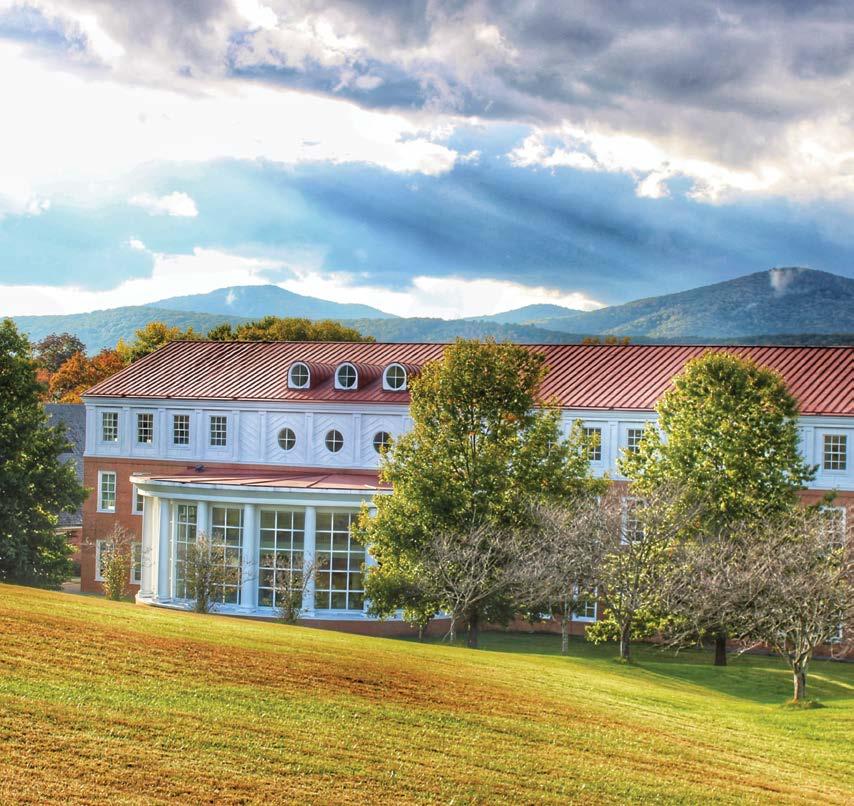
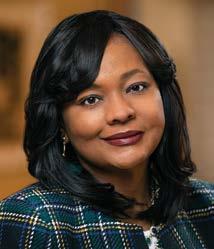

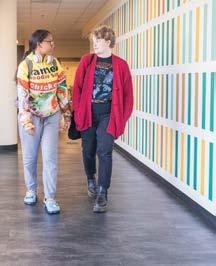
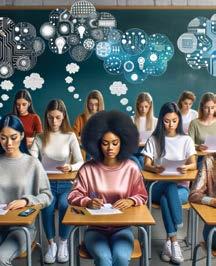
26 7 16 20 2
Hollins
Hollins Magazine
Vol. 74, No. 1
January - March 2024
EDITOR
Billy Faires, executive director of marketing and communications
ADVISORY BOARD
President Mary Dana Hinton, Vice President for Institutional Advancement Anita Walton, Associate Vice President for Alumnae/i Engagement and Strategic Initiatives Lauren Sells
Walker ’04, Director of Public Relations Jeff Hodges M.A.L.S. ’11
DESIGNERS
Sarah Sprigings, David Hodge Anstey Hodge Advertising Group, Roanoke, VA
PRINTER
Progress Printing, Lynchburg, VA
Hollins (USPS 247/440) is published quarterly by Hollins University, Roanoke, VA 24020. Entered as Periodicals Postage
Paid at Roanoke, VA. POSTMASTER: Send address changes to Hollins, Hollins University, 7916 Williamson Rd., Box 9688, Roanoke, VA 24020 or call (800) TINKER1.
The articles and class letters in Hollins do not necessarily represent the official policies of Hollins University, nor are they always the opinions of the editor. Hollins University does not discriminate in admission because of sexual orientation, race, color, national or ethnic origin, disability, genetic information, veteran status, marital status, age, political beliefs, religion, and/or pregnancy, childbirth, or related medical conditions, and maintains a nondiscriminatory polic y throughout its operation. Questions, comments, corrections, or story ideas may be sent to:
Magazine Editor
Hollins University
7916 Williamson Rd.
Box 9657
Roanoke, VA 24020
magazine@hollins.edu
16
Vision Centered on Mobility
The Levavi Oculos Strategic Plan enhances the landscape of what is possible for Hollins in the years to come.
by Billy Faires
20
AI and Academic Integrity
The rapid arrival and rise of artificial intelligence has forced Hollins and other universities to grapple with difficult questions.
by Sarah Achenbach ’88
26
An (un)Common Space
Recent renovations to the Wyndham Robertson Library aim to make it a hub for students seeking both information and human resources.
by Lindsey Hull
’23
2 A Letter from President Mary Dana Hinton 7 2022-23 Annual Report
Contents
A
DEPARTMENTS 3 In the Loop
To view the online version of Hollins magazine, visit hollins.edu/magazine or scan the QR code. ON THE COVER: Hollins University campus, reimagined in Adobe Firefly.
FROM THE President
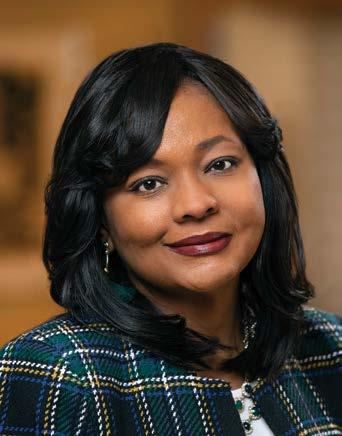
Dear Hollins community,
I am delighted to share with you our Transforming Learning, Transforming Lives: The Levavi Oculos Strategic Plan in this issue of Hollins magazine. What you will encounter in these pages reflects more than 18 months of work and engagement.
To create such a bold and transformational plan requires the work of many. I want to extend my most heartfelt gratitude to the on-campus community, led by our strategic planning teams, for their many hours of engagement. Students, faculty, and staff shared many hours visioning, planning, and collaborating.
I am truly grateful to the many alumnae/i who shared their hopes, fears, wisdom, and insights as we crisscrossed the country for presidential roundtables and various conversations.
A special debt of gratitude is owed to the Hollins Board of Trustees who, as my thought partners and coleaders, learned together and issued a bold charge to me and the Hollins community to draft this plan. I am equally grateful for their commitment to supporting the plan and the deep trust they have offered our community.
And I want to thank those donors who have already invested in the plan and are committed to ensuring we can live up to our promises. Thank you for supporting our community and our future.
As you read the feature story about this plan, you will see that it is a collective tapestry. The plan reflects the hopes and aspirations of many and is not a self-portrait of any one person. It is all of us at our best.
Thank you for trusting me with the leadership of Hollins and for supporting the Transforming Learning, Transforming Lives: The Levavi Oculos Strategic Plan.
Levavi Oculos, President Mary Dana Hinton
2 Hollins
Prestigious NSF Grant Received to Support Women in STEM
Hollins has been awarded a grant of $999,998 from the National Science Foundation Scholarships in Science, Technology, Engineering, and Mathematics Program (NSF S-STEM) to educate the next generation of diverse, highly skilled leaders in the STEM workforce.
Grant funds will support the development and implementation of Hollins’ Artemis Scholarship Program for Women in STEM, which is named for the Greek goddess of the hunt. It signifies the pursuit of knowledge and acknowledges NASA’s Artemis mission to land the first woman and first person of color on the moon.
Hollins’ Artemis Scholarship Program is for undergraduates majoring in biology, environmental science, chemistry, and mathematics. “The NSF grant will be used primarily to fully cover unmet
financial need for high-achieving, academically talented Artemis scholars, providing each with a full cost of attendance scholarship to Hollins University,” said Assistant Professor of Biology and Environmental Science Mary Jane Carmichael, the principal investigator for the initiative.
“Importantly, the grant also will strengthen relationships among the Artemis scholars, the faculty, alumnae/i, and the scientific community, promoting greater career awareness and opportunities and providing leadership skills development.”
Carmichael added that the first scholarships will be awarded to students in the 2024-25 academic year. The university plans to focus recruitment efforts in local high schools.
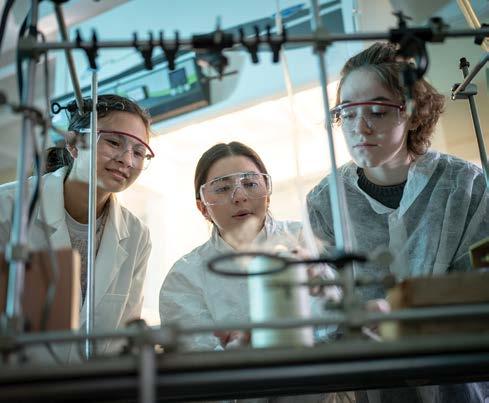
Board of Trustees
Extends President Hinton’s Contract
The Hollins University Board of Trustees voted unanimously to extend President Mary Dana Hinton’s contract through June 30, 2030. Hinton is Hollins’ 13th president and its first African American president. She joined Hollins in 2020.
“The board of trustees has the highest confidence in President Hinton, who has demonstrated outstanding leadership,” said Board Chair Debra Meade. “As we prepare for a bold future ahead for Hollins in an ever-changing world, it is essential that we ensure her visionary leadership remains in place through 2030.”
Meade cited Hinton’s numerous achievements of the past three years, including her and her team’s “steady, caring, and successful leadership during the pandemic”; her vision to create and fund an Imagination Campaign that led to updated facilities, new academic programs, and enhanced access, including the HOPE scholars program for students in the greater Roanoke region; and her work to foster student success, well-being, and belonging with an integrated approach that gives students better support and has improved retention rates.
Meade added that Hinton’s fundraising success has been “unmatched,” securing more than $100 million in gifts to the university in her first three years, including the single largest gift in the history of women’s colleges.
This past year, Hinton has overseen the development of a collaborative, transformational strategic plan for Hollins, while preparing to launch the largest comprehensive campaign in the institution’s history, Meade said.
“We could not be more pleased to have President Hinton as a part of our community, and we are grateful for her ongoing leadership.”
Winter 2024 3 IN THE Loop
Students Showcase Work During Virginia Tech Research Conference
Nine Hollins students were among nearly 200 undergraduates from across the country who delivered poster presentations at the 12th annual Summer Research Conference at Virginia Tech, held in July.
“Over the course of the past 10 weeks, these students have been engaged in a wide variety of projects tackling real-world problems in many disciplines,” Keri Swaby, director of the Office of Undergraduate Research at VT, stated at the conference. “As always, I am humbled by the quality of work and wealth of research that took place this summer.”
Jill C. Sible, associate vice provost for undergraduate education at VT, added, “Summer affords undergraduates the opportunity to dedicate significant time and effort to the planning, execution, and analysis of a research project. They have also had the chance to become authentic members of research teams by working with faculty, graduate students, postdoctoral fellows, and research staff. Many thanks to all who have mentored undergraduates this summer.”

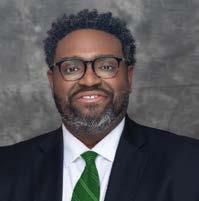
Brown Appointed Vice President for Student Success, Well-being, and Belonging
Hollins kicked off the 2024 calendar year by welcoming Gary L. Brown, Ph.D., as the university’s new vice president for student success, well-being, and belonging. He is responsible for critical components of the student experience outside of the classroom and serves as a committed student advocate.
“Dr. Brown was unmatched in the care he exemplified for our students and his deep desire to be a part of the Hollins community,” said Hollins President Mary Dana Hinton. “Every person with whom we consulted spoke to his quiet presence and yet his strength of character as a leader and
supporter of students. I believe he will elevate student success, well-being, and belonging to new heights and am excited to have him join the team.”
Brown comes to Hollins from Elizabeth City State University in North Carolina, where he was vice chancellor for student affairs since 2018. Last year, he was also named interim vice chancellor for university advancement. He previously served for 11 years in various roles, including dean of students and interim vice chancellor for student affairs at North Carolina Central University, and two years in North Carolina Wesleyan College’s Division of Academic Affairs.
4 Hollins IN THE Loop
Brown

VFIC Honors Professor
Morgan Wilson for Excellence in Undergraduate Teaching
Professor of Biology Morgan Wilson has been presented the 2023 Libby and Hiter Harris Excellence in Undergraduate Teaching Award by the Virginia Foundation for Independent Colleges (VFIC).
Wilson is among six faculty members from the VFIC consortium of schools who were recognized for their dedication to higher education and student success.
A member of the Hollins faculty since 2002, Wilson teaches courses in both the biology and environmental studies programs. Trained as a physiological ecologist, much of his research has focused on the physiology and behavior of birds. However, his field-based invertebrate zoology course, directed research with students, and an immersive field-based course in the Caribbean have led him to expand his research interests to include freshwater macroinvertebrates and the dynamics of coral reefs. His research has taken him to the edge of the Arctic, the Appalachian Mountains, the Mississippi Delta, the prairie pothole region of North Dakota, and coral reefs of the Caribbean.
The Harris family endowed awards to cite distinction in undergraduate teaching and instructional technology, and to showcase professors who are rising stars, as a way to highlight the special features of VFIC colleges and universities. The awards recognize faculty members “whose professional history reflects a strong, clear, and abiding commitment to excellence in classroom teaching within the undergraduate liberal arts and sciences.”
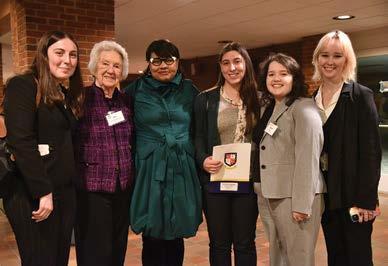
Hollins Captures 2024 VFIC Ethics Bowl Title
Hollins bested 14 other collegiate teams from across the commonwealth to win the Virginia Foundation for Independent Colleges’ (VFIC) 24th annual Ethics Bowl, January 28-29.
Team members included Merritt ’24, Shasta Power ’26, and Zoe Simotas ’25. Associate Professor of Philosophy James Downey and Visiting Assistant Professor of Philosophy Charles Lowney are the Hollins Ethics Bowl team’s faculty coordinators.
Student teams representing Virginia’s leading independent colleges and universities deliberated a variety of case studies related to this year’s theme, “Ethics and the Environment.”
At each Ethics Bowl, professionals from a variety of fields listen to four rounds of team presentations and award points based on their evaluations. The two top teams advance to the final round of head-to-head competition, which this year featured Hollins and the University of Lynchburg.
The winner receives the coveted Batten Trophy, named for the event’s initial funders, Jane and Frank Batten.
“The Ethics Bowl serves as a testament to the quality of not only VFIC students but also the colleges and universities in our consortium,” said VFIC President Matthew Shank. “Our schools provide a broadly pragmatic liberal arts and sciences education in environments that value and encourage ethical leadership and responsible citizenship. VFIC students are astute, informed, and articulate.”
This is Hollins’ second Ethics Bowl championship; the university won its first title in 2014.
At the event’s annual dinner on January 28, the VFIC honored Jane Parke Batten, a member of Hollins’ class of 1958, for her dedication to higher education, her community, and the Ethics Bowl program. She is a civic leader, community volunteer, and VFIC Honorary-Life Board Trustee.
Wilson
Winter 2024 5 IN THE Loop
The victorious Hollins Ethics Bowl team is pictured with President Mary Dana Hinton (third from left); Jane Batten ‘58 (second from left), a devoted believer in both Hollins and the Ethics Bowl; and Allison Goguen ‘24 (fourth from left), one of several student volunteers for the event.
Loop
Kennedy Center American College Theater Festival Cites Hollins for “Distinguished Achievement”
Hollins has received commendation from the Kennedy Center American College Theater Festival (KCACTF) National Awards Committee for “Distinguished Achievement in Support of the Playwright’s Lab at Hollins.”
“The commendation reflects the financial and travel support Hollins provides for students and faculty to participate each year in the KCACTF Region IV Festival,” explained Playwright’s Lab Director Todd Ristau. “Hollins has seen a remarkable level of participation at the festival and a consistent level of success across many award categories.”
The festival annually showcases work from student theatre artists representing colleges and universities

in Alabama, Florida, Georgia, Kentucky, Mississippi, North Carolina, Puerto Rico, South Carolina, Tennessee, the U.S. Virgin Islands, and Virginia.
A national theatre program, KCACTF brings together 18,000 students annually from colleges and universities across the United States. Since its inception, KCACTF has given more than 400,000 college theatre students the opportunity to have their work critiqued, improve their dramatic skills, and receive national recognition for excellence.
Student-Athletes Earn Academic Honors
Student-athletes from across the spectrum of Hollins Athletics have garnered recognition for their achievements in the classroom.
The U.S. Track & Field and Cross Country Coaches Association named the Hollins Women’s Track & Field team to the NCAA Division III All-Academic Team for 2023. Teams must have earned a cumulative grade point average (GPA) of at least 3.1 on a 4.0 scale during the 2022-23 school year to qualify for All-Academic Team status. Hollins Track & Field earned a team GPA of 3.45.
Sixty-four Hollins studentathletes were named by the Old Dominion Athletic Conference to its All-Academic Team for 2022-23. Prospective honorees must achieve a 3.25 GPA or higher for the academic year to be considered.
Six student-athletes representing basketball, soccer, tennis, and volleyball earned Academic AllState team honors for 2022-23 from the Virginia Sports Information Directors. To be eligible, undergraduates must be sophomores, juniors, or seniors and have a cumulative GPA of 3.25.
College Sports Communicators (CSC) recognized Hollins studentathletes in two categories. Six members of the soccer team were named by CSC to the NCAA Division III Academic All-District Women’s Soccer Team, while the association placed three volleyball team members on the NCAA Division III Academic All-District Volleyball Team, both for 2023.
HOPE Scholar Program
Thrives in Second Year
In 2021, Hollins announced the creation of a scholarship that prioritized lifting the burden of private college tuition for students with financial need. Designed for students living in the greater Roanoke Valley region, the Hollins Opportunity for Promise through Education (HOPE) scholar program specifically supports young women who wish to pursue a college degree at Hollins with zero tuition debt.
The initiative is proving to be an unqualified success. Now in its second academic year, HOPE boasts 62 scholars who because of the program are able to realize their dream of attending college.
“HOPE makes a college education affordable for young women regardless of their ability to pay and supports them in taking the next step toward achieving their academic and professional goals,” said Ashley Browning, vice president for enrollment management.
As part of Hollins’ efforts to further enhance the already vibrant community of students from the Roanoke area and build a pipeline for HOPE, the university has launched a residential summer experience for local students with limited financial resources. Designed to support underserved high school students, Knowledge for Freedom (KFF) is an immersive, two-week liberal arts program in which “young women who are curious about college life can live on campus, explore their interests, and discover new opportunities for their future,” Browning explained. “The program is completely free to participants, including housing on our beautiful campus and food expenses. KFF provides students an opportunity to study and build connections with Hollins students and professors who are invested in their growth early in their college search.”
The 2024 KFF Summer Program will take place July 14-27. Visit hollins.edu/kff or scan the QR code to learn more.
6 Hollins IN THE
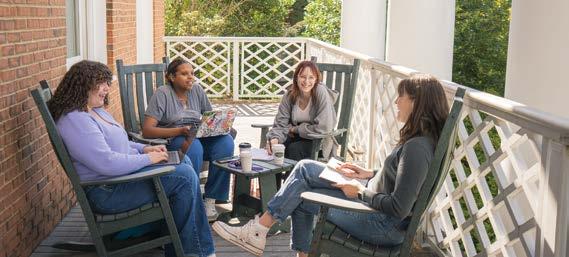

2022-23 Annual Report
In reflecting on our steadfast commitment to excellence in education and fostering opportunities for student growth, this report stands as a testament to the unwavering dedication and hard work of our students, faculty, staff, and supporters. As we prepare to support Transforming Learning, Transforming Lives: The Levavi Oculos Strategic Plan, our university’s strength grows, and our expanding community of supporters and partners propels us forward. Looking ahead, we are called to capitalize on our positive trajectory, uniting in our commitment to collaboration, teaching, and ensuring the brightest future for the coming decades.
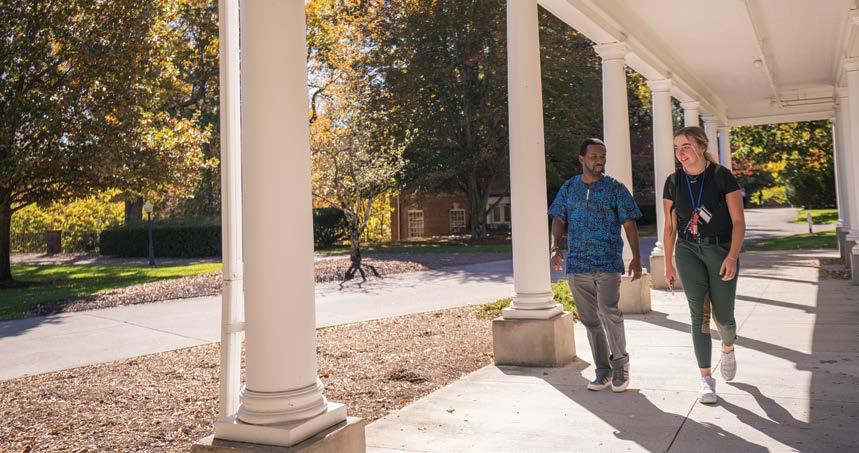
Winter 2024 7
Photos on this page by Boyd Pearman Photography
As I begin my second year as Vice President for Institutional Advancement, I consider it a daily privilege to witness your philanthropic gifts transform Hollins and the lives of our students. My team and I are excited to bring this annual report to our readers and share a snapshot of the support received over the last year, yet it can never reflect the totality of your contributions to Hollins. In addition to your financial support, we recognize your gifts of time, talent, and expertise which cannot be overlooked.
We are truly grateful for your generosity and appreciative of your loyalty and all the ways in which you uplift Hollins. It is our hope that others are inspired as they review and celebrate the exceptional commitments made to our beloved institution.
Just this past year we saw your generosity come to life with the opening of The Green, the integrative learning commons in the Wyndham Robertson Library. Together, we “moved mountains” on our annual Day of Giving. Looking ahead, I am most excited about Transforming Learning, Transforming Lives: The Levavi Oculos Strategic Plan. By 2030, Hollins will have implemented integrative learning practices, equity-minded access policies, extensive experiential learning, compassionate challenge, and holistic wellness to meet our mission call and ensure our sustainability.
I am so proud to be a part of the Hollins family as we embrace and further our essential 182-year-old mission and support our beloved campus community. Your generosity enables us to create an increasingly holistic and enriching environment for our students, faculty, staff, alumnae/i, and friends.
I look forward to all we will accomplish together in the coming years.
Sincerely,
Anita Branch Walton Vice President for Institutional Advancement
Endowment—Total Assets Market Value
Fiscal Years Ending June 30
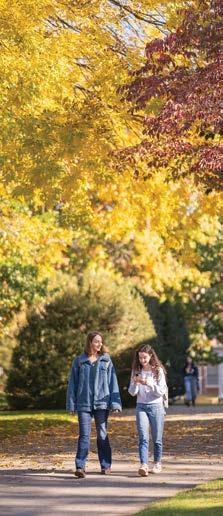
100 150 200 250 MILLIONS 2013 2014 2015 2016 2017 2018 2019 2020 2021 2022 2023 $164.9 m $180.7 m $171 m $160.8 m $182.2 m $186.3 m $182.7 m $174.6 m $219.5 m $214.7 m $254.8 m
2022-23 ANNUAL REPORT
8 Hollins
Boyd Pearman Photography
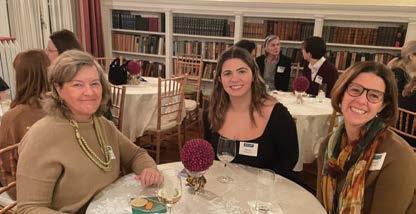

GIFT TYPE DOLLARS RECEIVED New Gift 17% $6,252,390 Payment on new pledge 0% $169,943 Previous Year Pledge Payment 83% $31,283,893 GRAND TOTAL $37,706,226 PURPOSE DOLLARS RECEIVED Capital Projects 5% $1,706,155 Endowment 82% $30,876,430 Gifts in Kind 2% $801,583 Hollins Fund 8% $3,139,768 Other Current Support 2% $597,099 Special Projects 1% $532,266 Undesignated Estates 0% $52,925 GRAND TOTAL $37,706,226 SOURCE DOLLARS RECEIVED Alumnae/i 76% $28,667,640 Corporations/Businesses 1% $486,448 Foundations 18% $6,881,692 Other 3% $996,045 Parents 2% $674,401 GRAND TOTAL $37,706,226 2022-23 ANNUAL REPORT 5% 8% 2% 82% 76% 1% 2% 0% 1% 18% 3% 2%
17% 0% 83%
Gifts BY PURPOSE Gifts BY TYPE Gifts BY SOURCE
New
York City J-Term alumnae/i reception
Winter 2024 9
Washington, D.C., J-Term alumnae/i reception
In fiscal year 2022-23, donors invested just over $2.56 million in capital projects. In October 2023, space was reallocated in the Wyndham Robertson Library for student success-oriented resources, providing students with a singular point of access to academically aligned opportunities. Co-locating the Rutherfoord Center for Experiential Learning and programming provided by Student Success, Well-being, and Belonging (SSWBB), including HU Connect and DEI, helps to foster greater collaboration among these programs and facilitate availability for students. In addition to housing student accessibility services, the renovations to the library include academic support, enhanced and varied study spaces on all floors, new classroom space, and a podcasting studio.
Donors also invested in the expansion of the Student Apartment Village. With this visionary philanthropy, the village has expanded to nine home-style residences, giving Hollins students a beautiful and welcoming place to live, work, and dream. Located atop the crest of the Hollins campus on what was known as Faculty Avenue, the village is part of a vibrant and diverse mix of housing options for Hollins students and is a highly desired housing option.
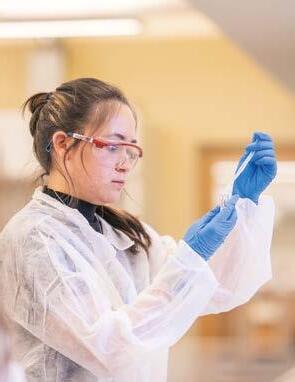
Hollins donors expand opportunities for learning and living well in the Hollins community and beyond. Hollins Fund
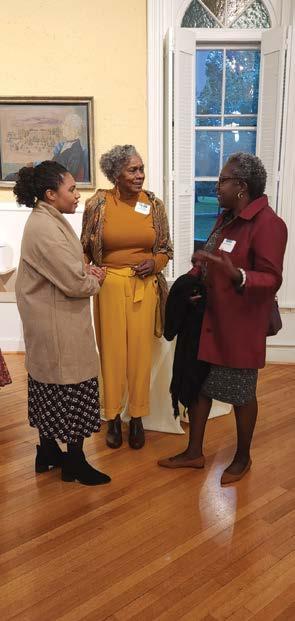
Your generous contribution to the Hollins Fund plays a vital role in recruiting and supporting high-achieving students, enabling them to excel both academically and personally. The Hollins Fund accounts for 11% of the operating budget each year. The funds raised through the Hollins Fund primarily support student scholarships. At the core of Hollins are its dedicated students and faculty, and your annual gift ensures the provision of the quality education they deserve. In fiscal year 2022-23, the Hollins Fund made a significant impact, contributing $3.1 million of the total $12.7 million in philanthropic contributions. Your ongoing support allows us to offer attractive designations within the Hollins Fund, focusing on general scholarship; student success, well-being, and belonging; and internship and study abroad opportunities, which can be transformative for students’ experiences and future careers. Thank you for joining us in our mission of bettering society one Hollins student at a time.
For more information on the Hollins Fund, please contact Noelle N. Cook at cooknn@hollins.edu or (540) 362-6411.
2022-23 ANNUAL REPORT
President’s reception in Roanoke
10
Boyd Pearman Photography
Hollins
Gifts to the Hollins endowment create the foundation to strengthen our academic programs and support our students into the future.
Hollins continues to operate within the board-approved budget and with no external debt. Much of this financial stability is due to our alumnae/i and friends who, devoted to Hollins’ long-term financial health, added just over $30.8 million to the endowment last fiscal year. This includes the $25 million pledge payment to the Levavi Oculos Endowed Scholarship Fund, which was created in December 2021 with a pledge of $75 million from a generous anonymous alumna, the largest gift ever made to a women’s college. As of June 30, 2023, the Hollins endowment boasted a market value of $254.8 million.
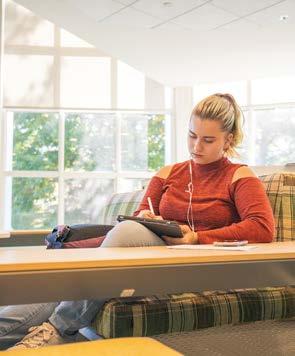
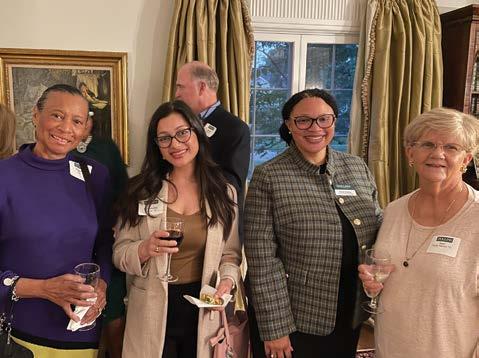
Donors made Hollins a lasting part of their legacy.
During the last fiscal year, Hollins received one new revocable bequest intention for $250,000 and received 13 total bequests for $497,848. Alumnae/i, parents, and friends who have indicated that they have made a bequest provision or planned gift commitment for Hollins in their estate plans are members of the Heritage Society. Today the Heritage Society has 506 members.
Suzy Mink at
2022-23 ANNUAL REPORT
For more information on planned giving, please contact
Houston alumnae/i reception
minks@hollins.edu or (202) 309-1750.
Winter 2024 11
Boyd Pearman Photography
Volunteers, who give their time and talents making Hollins a better place, make Hollins better for all of us.
Our volunteers are the heartbeat of our organization, infusing passion and dedication into every role they undertake. From the class reporters, reunion gift chairs, Alumnae Board, Board of Trustees, and more, their selfless contributions drive the success of our operations. Their diverse skills and unwavering commitment amplify our impact, making a lasting difference. We extend heartfelt gratitude to each volunteer for their invaluable service, shaping a brighter future together.
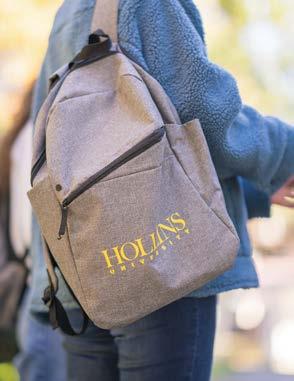
For all 2022-23 volunteers (364 total):
54 are Heritage Society members
15%
194 were celebrating reunion in 2023
53%
39 are celebrating reunion in 2024
238 gave in FY23
11%
65%
110 have given as of December 31, 2023
30%
To show the impact of our volunteers, our reunion gift chairs for the classes ending in 3s and 8s and the class of 2021 made a huge impact for Reunion 2023.*
Highest total giving for all purposes
Class of 1968 (with $533,504)
Class with the largest total gift to the Hollins Fund
Class of 1968 (with $528,404)
Class with the highest Hollins Fund participation in giving to Hollins
Class of 1973 (with 44.6%)
Class with the highest Hollins Fund participation in 2nd-, 5th-, and 10th-year classes
Class of 2013 (with 7.3%)
President Nancy Oliver Gray Award
Tinker Mountain Award
Catherine Orgill West ’51 Award
Hollins Rock Award
2022-23 ANNUAL REPORT
* Reunion award totals are as of Fiscal Year End on June 30, 2023.
12 Hollins
Boyd Pearman Photography
2022-23 Volunteer Leadership
2022-23 Board of Trustees
Patricia Thrower Barmeyer ’68
C. LaRoy Brantley
Tracy Roberts Frist M.A. ’03, M.F.A. ’14*
Callie Virginia (Ginny) Smith Granade ’72
Rev. Dr. Cynthia Hale ’75
Lucy Davis Haynes ’84
Antoinette Hillian ’00*
Paul Hollingsworth
Dr. Cynda Ann Johnson
Mary Terrell Joseph ’66*
Leslie Dunne Ketner ’84
Sandra Kiely Kolb ’70
Elizabeth Brownlee Kolmstetter ’85
Anne Lindblad ’79
Dudley Wood Macfarlane ’77
Debra Cartwright Meade (board chair)
Janet C. Nicholson ’69
John W. Poulton
Elizabeth Goodman Pritchard ’80*
Karen Rabenau ’89
Sabrina Rose-Smith ’00
Savon Shelton Sampson ’04
Natasha Trethewey M.A. ’91
Will Francis Trinkle*
Alexandra Trower ’86
2022-23 Alumnae Board
Emily Daniels Ashton ’06
Nancy Peterson Benninger ’02
Allison McHenry Bough ’93
Blair Neill Celli ’03
Anna Cork ’96, M.A.L.S. ’04
Susan Schnider Duke ’76
Diane M. Hall ’88
Kristin Jeffries Henshaw ’94
Antoinette Hillian ’00 (president)
Linda Bertorelli Jennings ’85
LaNita Lykes Jefferson ’07
Christine LeFever Kmieczak ’92
Jeanne “Scout” Moran ’16*
Emily Morgan ’79*
Dee Mudzingwa ’07
Beatrice Shaw ’91
Elysse Stolpe ’10*

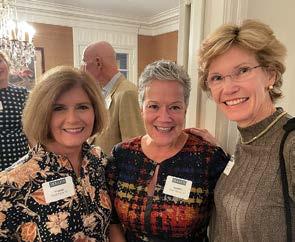

2022-23 ANNUAL REPORT
Last year of service, 2023
*
Boston alumnae/i reception
Houston alumnae/i reception
Winter 2024 13
Dallas alumnae/i reception
Giving Society Recognition
We are profoundly grateful to our donors who give loyally each year, make leadership gifts, and those who include Hollins in their estate planning. Thank you for lifting up Hollins. Many of our donors are recognized in the following giving societies:
Levavi Oculos Society
The Levavi Oculos Society is a lifetime giving society for donors whose cumulative giving to Hollins surpasses $1 million. The university motto, Levavi Oculos (from the 121st Psalm: “I will lift up mine eyes unto the hills”), emphasizes leadership and service in accord with Hollins values and traditions.
The 1842 Society
The 1842 Society is composed of some of the most passionate and dedicated donors and friends of Hollins. It honors the year that Hollins was founded and is the brainchild of Pat Thomas Bain ’49, who helped to establish the society in 1968. Members of the 1842 Society give at least $1,842 during the year to any designation at Hollins, though the majority of donors choose to make their gifts directly to the Hollins Fund.
The Heritage Society
Alumnae/i, parents, and friends who have indicated that they have made a bequest provision or planned gift commitment for Hollins in their estate plans are members of the Heritage Society. Today the Heritage Society has 506 members.
Miss Matty’s Circle
Miss Matty’s Circle recognizes young alumnae/i and students who are leadership donors. Miss Matty’s Circle honors Matty Cocke, daughter of Hollins’ founder, president of Hollins from 1901 to 1933, and the first woman to head a college in Virginia.
Marian Wolff Young Society
The Marian Wolff Young Society is named in honor of Marian Wolff Young, class of 1929, who made a gift to Hollins every year from her graduation until her death in 2008—nearly 80 years. The Marian Wolff Young Society recognizes those donors who give every year since graduation.
2022-23 ANNUAL REPORT
14 Hollins
Ways to Give
All gifts to Hollins are tax deductible.
Hollins’ fiscal year begins July 1 and ends June 30.
Hollins’ Federal ID number is 54-0506314.
Credit Card Online
Make a one-time or recurring gift online on our online gift form (alumnae.hollins.edu/gift).
Hollins accepts American Express, Visa, Mastercard, and Discover.
Checks
Mail a check (or set up an automatic bill pay with your financial institution) to:
Hollins University
Institutional Advancement Box 9629 Roanoke, VA 24020
Wire/ACH Transfer
Contact the Institutional Advancement Office at (800) 846-5371 or email gifts@hollins.edu with your name, intended gift amount, and the purpose of the gift. Hollins will share account information for the transfer upon request.
Scan the QR code to give
Real Estate or Personal Property
Hollins accepts gifts of real estate or personal property (art, horses, etc.) for related use.
• For gifts of horses for the Hollins Riding program, please contact Sherri W. West, director of riding/ head coach at westsw@hollins.edu or (540) 808-7701.
• For any other type of gift, contact the Institutional Advancement Office at (800) 846-5371 or email gifts@hollins.edu to be connected with the appropriate staff member to discuss your donation.
Securities: Stocks and Bonds
Contact the Institutional Advancement office at (800) 846-5371 to give the name of the stock, the number of shares you intend to transfer, the approximate value of the stock, and the purpose of your gift. Have your broker call or send an email to Jodie Wertz-Sutphin or Stephen Waskey at the Roanoke office of Morgan Stanley: jodie.wertz-sutphin@morganstanley.com; (540) 983-4907 or (540) 983-4913.
Give Through your IRA
If you are 70 ½ or older, a charitable gift transferred from your IRA by December 31 directly to Hollins will not be taxed and can also satisfy your required minimum distribution (RMD), maximizing the benefits to both you and Hollins. Contact Suzy Mink ’74 at (202) 309-1750 for more information.
Payroll Deductions
Faculty and staff of Hollins University are eligible to sign up to make their gift to Hollins through payroll deduction.
Donor Advised Fund
Direct a grant to Hollins through your Donor Advised Fund.
Planned Giving
Create a legacy at Hollins through a bequest or other deferred gift. Contact Suzy Mink ’74 at (202) 309-1750 to discuss the options.
Matching Gifts
If your company, your spouse’s company, a company from which you are retired, or a corporate board of which you are a member has a matching gift program, getting your gift matched is easy. Check with the company’s personnel office.
2022-23 ANNUAL REPORT
Winter 2024 15
A Vision Centered on Mobility

By 2030, Hollins will have implemented integrative learning practices, equity-minded access policies, extensive experiential learning, compassionate challenge, and a holistic wellness focus to meet our mission call and ensure our sustainability.
Vision Statement for Transforming Learning, Transforming Lives: The Levavi Oculos Strategic Plan
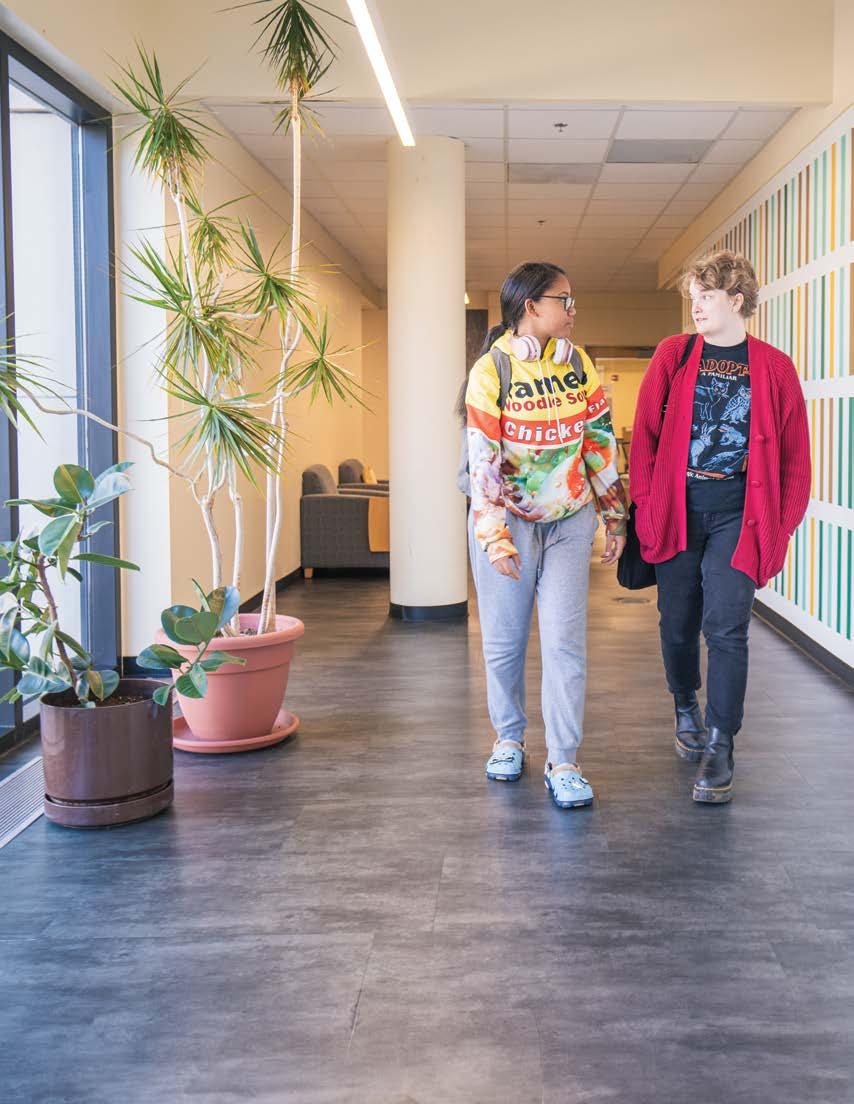 BY BILLY FAIRES
BY BILLY FAIRES
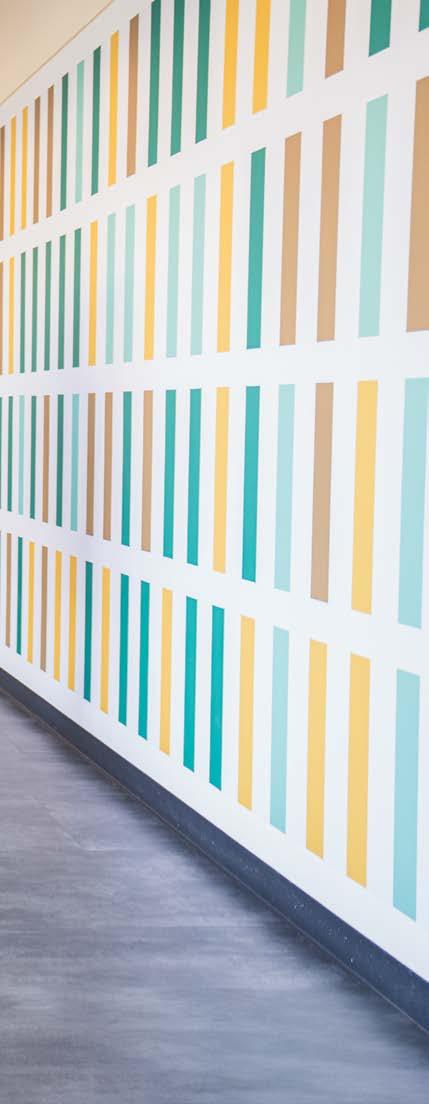
To meet the array of challenges facing Hollins and all institutions of higher learning in this decade and beyond, President Mary Dana Hinton knew that the university needed a shared vision and bold path forward.
“A strategic plan cannot merely be a forecast or a prediction,” she explained. “An organizing vision must be at the center of the plan, seeing what a unified Hollins could become, that is attainable, even if incredibly difficult. And an effective vision requires sufficient resources, collective energy, and enthusiastic buy-in.”
As such, when Transforming Learning, Transforming Lives: The Levavi Oculos Strategic Plan was officially approved at the Fall 2023 meeting of the Board of Trustees, it was not merely an exciting beginning of something that will enhance the landscape of what is possible for Hollins. Rather, it was the culmination of a deliberate and thoughtful process built around input and conversation. Building collective energy and enthusiastic buy-in for the plan were priorities from the start.
During an 18-month span, Hinton and key leaders organized almost 40 different planning sessions to listen and gather input from the full array of stakeholders.
Over the course of that time, some 500 people—including more than 200 students and almost as many alumnae/i and donors—took advantage of the opportunity to express their hopes and dreams, as well as their concerns, for what Hollins could be in five to 10 years.
The resulting plan, necessarily bold and ambitious, carries the hopes of hundreds if not thousands. The challenge of achieving the goals within it is lightened by the involvement of so many voices.
Accelerating, Expanding Upon The Hollins Mission
The core of this plan is, simply and boldly, to become the nation’s higher education leader in economic, social, and civic mobility.
“Everything in the plan is in there to serve that overarching goal of social mobility for our students,” said Nora Kizer Bell Provost Laurie McLary, who served as one of eight planning team leaders working alongside President Hinton throughout the developmental process.
The plan is divided into three essential categories: Access, Academic Excellence, and Wellness. In early conversations with the planning
committees, there was agreement that these are not seen as stand-alone groupings, but rather as interdependent, where the success of achieving the goals in one category is inextricably linked to the success of achieving goals in the other categories.
As such, the visual concept of gears came into play, as all three must work together for movement to take place. Within those gears are a total of 11 key goals, and all must coordinate to serve the vision of a university focused on maximizing economic, social, and civic mobility for its students.
The 11 Primary Goals of the Strategic Plan
GEAR ONE
Academic Excellence
1. Academic Renewal and Interdisciplinary Integration
2. Transformative Learning to Advance Social Mobility
3. A Humane Workplace for Thriving
4. Expand Online Degree Offerings for Adult and Continuing Education Learners
GEAR TWO
Access
1. Remove Financial Barriers to Undergraduate Education
2. Provide Premier Pathway to— and Through—College: Holistic Student Services and Support Systems
3. Strengthen Impact as a High-Value Regional Partner
Wellness
1. Build a Dynamic, Comprehensive Wellness Center
2. Increase Engagement In and With the Natural World
3. Create a More Inclusive and Accessible University
4. Implement Comprehensive Equine Studies Program
G EART
Photos featured in this article by Boyd Pearman Photography Winter 2024 17
HREE

Access
Among the most ambitious and game-changing goals in the Levavi Oculos Strategic Plan is to make Hollins affordable for all enrolling undergraduate students. Or, more succinctly, “worryfree tuition.”
“‘Worry-free tuition’ is a shortcut way of acknowledging the wide range of economic challenges and complexities that students face when considering college,” noted Ashley Browning M.A.L.S. ’13, vice president for enrollment management, who served as coleader of the access team planning committee. “It’s not merely about the price tag or what your family qualifies for, or additional pressures on your family that may not come into the more formal financial aid equation.”
Worry-free tuition represents a pathway to access Hollins without the financial and emotional burden of tuition costs, she said. “It’s a powerful and effective way to bring the Hollins experience to academically talented students from all socioeconomic backgrounds.”
Browning noted the tremendous success seen with the HOPE (Hollins Opportunity for Promise through Education) Scholarship (hope.hollins.edu) for undergraduate students in the Roanoke area in only its first two years.
The HOPE Scholarship, first offered to undergraduates entering in the fall of 2022, gives Pell-eligible students within 40 miles of campus the opportunity to attend Hollins tuition-free. Preference is given to students with financial need.
So far, 62 students have enrolled in the two years the program has been available, and both their GPA and retention rate are above average compared to other students, Browning said.
“The goal would be to expand the effectiveness of this effort across different geographic regions,” she added.
Research is underway regarding how Hollins might best approach bridging the cost of tuition for future students. Meeting this goal would require a tremendous influx to the university’s endowment. Additional tactics to support worry-free tuition are also being studied, including programs akin to the “work college” approach, most prominently adopted by Berea College. According to the Work Colleges Consortium, the concept requires that residential students participate in a comprehensive work-learning-service program for all four years of enrollment; all resident students have jobs.
Beyond that transformational aspect of the Access gear are goals intended to expand entry points for nontraditionally aged students who could find their place at Hollins. These include possible dual enrollment opportunities for high school students; expanding three-year degree options; bridging more common barriers such as technology access (e.g., becoming “an Apple school”); and expanding the support networks already developing within the university’s department of student success, wellbeing, and belonging.
Academic Excellence
In the area of Academic Excellence, the goal foremost in McLary’s mind is the proposed Center for Teaching Excellence.
“We need to intentionally develop what I think of as interlocking ecosystems,” she said, “where students encounter classrooms that are attuned to their needs as learners. We know there are effective ways, inclusive teaching practices, that can help students from a variety of backgrounds.
“This center would be a vital space for the faculty. We need to provide our faculty with ongoing professional development opportunities that expand their understanding of how students learn, of evidence-based teaching practices. We need to support them in adapting to the new and evolving needs of our learners.”
The strategic plan also includes exploring an alternative school calendar— such as shorter blocks so that students can focus on fewer classes at one time— that could better accommodate a diversity of learners, such as Horizon (nontraditional adult) students and graduate students as well as those who are commuters or need to work to afford enrolling. Expanding summer offerings is also in the works.
Another involves re-envisioning how Hollins structures its academic offerings. As President Hinton has noted, the academic divisions that appear in the 1938 yearbook are the same that exist today.
“Re-envisioning our academic structure will allow us to offer more interdisciplinary learning experiences,” McLary said. “Dispositional learning and mindsets, such as cultivating the ability to work across differences and self-awareness, combined with interdisciplinary learning will allow students to engage in an educational experience that includes areas of disciplinary knowledge with intellectual and social growth and development. Interdisciplinary learning coupled with grappling with real-world problems will prepare students better for an unscripted future.
“And, importantly, we need to find areas of clear strength and distinction for Hollins and lean into those.”
18 Hollins
Wellness
The centerpiece of the third gear, Wellness, would be a comprehensive, holistic wellness center to house a range of wellness-related programing and services for students and employees. The Cynthia L. Hale ’75 Holistic Wellness Center will be located within a significant expansion of the current athletic complex on the Back Quad of campus.
Research has made clear that student success and excellent educational outcomes are intricately related to student well-being, including physical, emotional, environmental, and spiritual wellness. The programs located in the wellness center will not only collaborate with the athletics department to expand fitness and recreational programming to meet the broad range of interests of the student body, but the center will also include spaces for health and counseling services, wellness therapies, spiritual and meditation retreat spaces, nutritional services and cooking, classrooms, and more.
“The pandemic exposed how underprepared and understaffed colleges and universities were to support the increasing mental health and wellness needs of current students,” said Kerry

Edmonds, executive vice president and chief operating officer and one of three leads for the wellness planning team. “We simply cannot achieve goals regarding mobility for our graduates if we do not provide them the tools, programs, and pathways to help students flourish and grow both intellectually and socially in order to reach their full potential.”
In addition to the wellness center, the plan includes goals for expanding student opportunities in outdoor spaces on and beyond the campus, creating an equine studies program that could expand on the great things already happening within Hollins’ riding center, and updating key buildings and spaces within the university to make them more accessible and inclusive.
A key focus in this final area, Edmonds noted, would be a significant renovation to West Hall, including the addition of a new climate control system (HVAC) and an elevator. Both improvements to West will support current students during the academic year but will also allow Hollins to expand its summer programming and extend the appeal of the historic building.
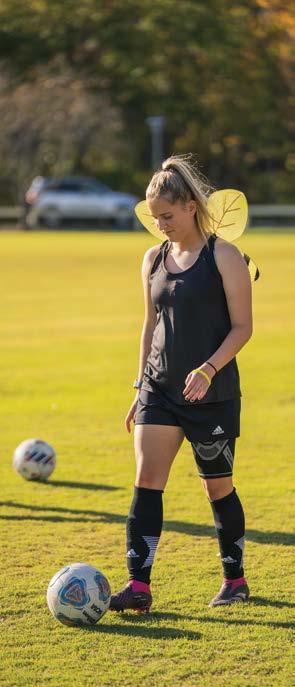
A Plan That Embraces Community
Hinton is confident that Transforming Learning, Transforming Lives: The Levavi Oculos Strategic Plan upholds Hollins’ responsibility to the next generation of learners entrusted to the university. However, she also emphasized that it does not solely reflect the aspirations of a select few.
“Everyone who has ever invested their time here as a student, who has graduated, who has given of their time or their resources, who has trusted their child to this institution, holds ownership in what Hollins is and should be,” she stated. “This plan needed to
honor as many of its community members as possible, and I believe it does that, which is why I’m so excited and eager to move forward.
“I can’t stress how important it was, to me and to our dedicated trustees, that this strategic plan be something that represented not just my hopes and vision, and not just their hopes and vision, but a plan that honored the hopes and vision of as many of our stakeholders as possible. We are but stewards of this incredible place. This isn’t my Hollins or the trustees’ Hollins, but your Hollins and our Hollins.”
Winter 2024 19


and Academic Integrity
BY SARAH ACHENBACH ’88
and decorative type created in Adobe Firefly. 20 Hollins
Image
By identifying patterns to create needed interventions, artificial intelligence (AI) helps humans solve complex problems like improving cancer screenings, identifying diseases, or saving the world’s bee population.
It’s also impacting college campuses across the U.S. Administrators and faculty are wrestling with balancing AI’s promise while maintaining academic integrity. Until recently, AI was still mainly and firmly planted in the “someday” realm for most campuses. The November 2022 launch of ChatGPT (short for Chat Generative Pre-trained Transformer) changed all that.
Launched by OpenAI, a private research lab focused on developing safe AI to benefit humanity, ChatGPT is a large language model. All users need to do is go to chat.openai.com or Microsoft Copilot (the AI chatbot formerly known as Bing Chat), register with an email address, and type questions, called prompts, in the message box.
Users can ask for travel recommendations or type in the ingredients in their fridge for menu suggestions. They can also type in “What are the allegorical examples in As You Like It and how do they relate to the play’s main themes?” Or “write a 1,000-word essay about the causes of the Tet Offensive.”
In the time it takes to read these last four paragraphs, ChatGPT will have scoured the entire internet, reviewed all publicly available texts, and, using complex mathematics to connect different digital breadcrumbs, spit back an answer to the user’s prompt.
If that sounds like ChatGPT will research and write a paper, it can. Users can even request a desired style, length, format, and details. Imagine the temptation during finals week when a student is staring down three research papers, none of which are started.
This new technology has challenged colleges and universities to figure out how to guide students using AI to enhance their own work, not replace it. Hollins’ current academic integrity policy states that anything a student generates using AI that is not cited as

such is a form of plagiarism. So far, there have been no Honor Court cases related to AI.
But there’s no way for faculty to check that a student used ChatGPT, no database to run an assignment or take-home essay through to see if it was AI-generated. And technically, ChatGPT-created work is not original. AI merely parrots back what has already been written and is publicly available on a topic.
“Our faculty is actively grappling with [AI],” says Nora Kizer Bell Provost Laura McLary. “Right now, they decide individually to what extent students can or can’t use AI. Some faculty are embracing it in different ways, while others are choosing to restrict or ban its use altogether in their classes.”
To help faculty better understand AI, McLary has provided resources curated by Sara Sprague, digital pedagogy and scholarship librarian at Hollins’ Wyndham Robertson Library. This past fall, McLary tapped Vladmir Bratic, associate professor and chair of communication studies, and Giancarlo Schrementi, assistant professor of computer science, to lead several voluntary professional development seminars on AI, which continue this winter and spring. She’s also created a new faculty and administrator task force to explore deeper professional development and student educational opportunities, like a possible course on the ethical implications of AI, and including the topic in general education courses.
Winter 2024 21
Nora Kizer Bell Provost Laura McLary as envisioned by DALL-E.

“How can we get students to think alongside technology? We have responsibility to teach students how to embrace new technology.”

“[AI] is ubiquitous, and so we want to encourage faculty to have conversations with their students and some engagement with ChatGPT,” adds McLary.
She knows students are grappling with the ethical ambiguity of ChatGPT and are looking to professors for guidance. “We know when they get out into the work world, AI is everywhere. We need to provide students with guidance to navigate that world.”
McLary, Bratic, and Schrementi agree that for college students today and the coming generations, it’s not a question of whether AI will be part of their daily work life. It will be.
AI is being used across all industries— business, medicine, art. (I used it to transcribe every phone interview conducted for this article, which saved me hours of tedious work.) We can argue boon or bane, but it’s not going anywhere. There are 100 million weekly users of ChatGPT—one of many generative AI tools today—and nearly 1.5 billion monthly users. (While free, OpenAI now offers a subscription version for $20/month).
“Four years from now, there will be zero bosses who will be saying ‘Can you do this thing for me, but you cannot use ChatGPT,’” says Bratic, who explains that’s the equivalent today of not allowing someone to use Google for a job. He’s been studying AI for the past decade and has his eye and curriculum on the current, first-year Hollins student who is going to be two years into a new job in 2030. “How can we get students to think alongside technology?” Bratic asks. “We have responsibility to teach students how to embrace new technology.”
McLary concurs: “How do we give them the tools that they need to engage with AI critically? It isn’t simply asking ChatGPT to write a paper for you. It’s about teaching students to create better prompts to help edit or find more precise language for a paper they’ve written, even to coach and tutor students to deepen their thinking.”
Hollins’ small class size and focus on student-faculty relationships are advantages to this approach. “Our faculty
22 Hollins
Image created with DALL-E
have their eyes on every single student,” McLary says. “They know them as individual people. I think it would be incredibly challenging if we were in an institution with really large lectures. How do you monitor that? In some ways, [Hollins] is exactly the right place, the right environment for having really deep and engaged conversations.”
Some colleges and universities have banned the use of AI, while others, like Hollins, are beginning conversations about how to incorporate it appropriately into deeper student learning. Everybody’s playing catch-up.
“When ChatGPT came out, everybody was unprepared for it,” says Bratic. “Academia is slow to turn when it comes to embracing new technology. Thinking defensively is the most reductive way to think about new technology.”
Last July, he wrote in Faculty Focus, an online teaching resource, that integrating AI “… into traditional human knowledge acquisition is essential to the future of universities.” In the article, he argues that “the first step might be to accept the inevitability of technological advancement and to embrace collaboration with technology and robots (cobotics) as to combine the strengths of both humans and technologies.”
Bratic has spent the past few years leading up to ChatGPT’s late 2022 release heralding its reality. In the AI awareness seminars, he works to guide colleagues who’ve never used the technology (the majority of Hollins faculty, he notes) to understand it. Understanding is the first step, Bratic explains, in developing Hollins’ systematic response to AI.
That response may indeed require a shift in pedagogy or teaching methodology. “If my class is set up in such a way that a final exam or major midterm paper can be answered by a simple prompt to ChatGPT, the problem is not with the technology, the problem is pedagogy,” says Bratic, whose exams are open book, notes, and internet. “I encourage my students to lean on technology to help them solve a problem, to use their brain for analysis or synthesis for the interpretation for contextualization. These are the skills I want them to have.”
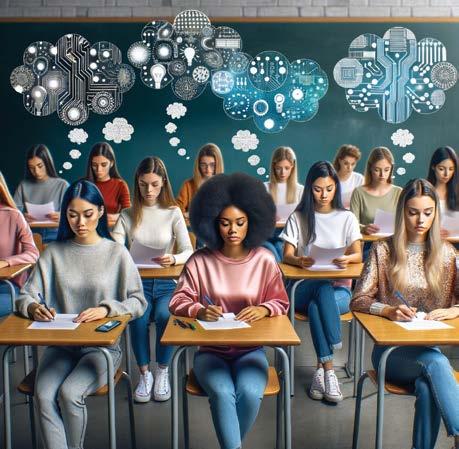
He encourages his students to check their answers with ChatGPT and compare the results to examine the efficiency and inefficiencies in their own thinking. “If I assign an outline, I ask them to feed their outline into ChatGPT and ask the same questions [the student] would ask of me, then come to me to compare and discuss the answers,” Bratic says.
McLary sees the coming paradigm shift in the classroom. “Traditionally, higher education’s curricula are focused on content delivery, the lecture mode where students summarize [information] back to the professor in a paper,” she explains. “How do we then reshape our classrooms?”
Project-based learning and other newer teaching approaches are finding their way into classrooms and labs across the country. McLary cites flipped classrooms, where students do readings and work prior to class, then spend class time engaged in hands-on projects and collaborative problem-solving with peers. AI, she says, can be a valued partner in these newer approaches. “This gives us the chance to shift the
balance toward more dispositional learning, for example, solving complex problems or working collaboratively, rather than solely on content,” adds McLary of the need to incorporate multiple modalities beyond lectures. “This way, we can put the emphasis on student engagement.”
Linh Nguyen ’24, a mathematics major and data science minor, is doing just that—embracing AI as a tool. For her senior research capstone project, she’s created a bot (AI robot) that responds to natural (spoken) language to query private, not public, databases.
“To query a database, you have to learn programming languages like structure query language (SQL),” she explains. “We’re building a tool to allow someone to query a database without knowing SQL.”
Under the guidance of Schrementi and using ChatGPT, Nguyen has created her bot to understand prompts such as “Give me the number of math majors who also minor in the humanities” and then write the needed SQL query and process the results in a data table for the user.
Winter 2024 23
DALL-E’s interpretation of female college students focused on taking a test.
The complexity of her project lies in the fact that OpenAI does not have access to Hollins’ or any other private database. “The problem we must overcome is how to have AI interact with our database and maintain data integrity and privacy,” says Nguyen, who plans to work in AI following graduation. “How do we get the results we want without exposing our database to the OpenAI model?”
Nguyen uses blockchain technology— a shared, immutable digital ledger that records and tracks assets safely and securely—to run the SQL query through the private database and to process the results. To keep OpenAI from gaining access to Hollins’ private data, she cuts off the loop before the bot gives the answers to ChatGPT.
The impact of her project means more efficient, productive work. “This makes it more user-friendly for faculty and
staff across campus who work with Hollins’ data,” Nguyen says. “Most people don’t know how to query a database or know how to code.”
She learned to code in Schrementi’s classes. He now allows students to use AI to provide code, standard operating procedure in the computer science field. “There are not a whole lot of variants with code,” he says. “It’s not like you’re writing a paragraph where there’s a variety of word choices. My focus is having them be able to translate their thoughts into code.”
For Nguyen, this process turns into a conversation. “I ask AI how I can use a syntax or algorithms, and sometimes it provides stuff from different libraries and different frameworks. When the code doesn’t work, I let OpenAI know that it’s not working, so it’s learning from me as well.”

She’s seen friends use AI to expand their ideas for essays, literature reviews, and research papers, but admits the results are less than perfect. “I feel it’s really noticeable if you copy and paste the [ChatGPT] paragraphs into your paper because sometimes it uses really weird vocabulary,” she says. “I never use it for my math or statistic courses because there is zero chance that it would give me back anything. You can ask it, ‘what is one plus one,’ but our math is really advanced.”
“Soulless” is the word typically used to describe AI-generated writing, a critique with which Bratic agrees. For now. “Writing good fiction, music, poetry, and art are purely human characteristics, but these are all cognitive things that are going to be definitely outmatched by technology,” he explains. Bratic is teaching a spring survey-type course, Communication and Technology, exploring how technologies change societies from cave paintings to AI.
He cites Wikipedia, which “when it first came out, it was widely derided as bad. Now Encyclopedia Britannica is no longer published. Judge AI knowing that these things change and get better. I can guarantee that in ten years, it’s going to be much better.”
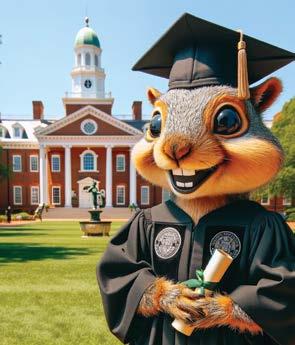 DALL-E
DALL-E
24
DALL-E-created squirrel graduate
Hollins
Schrementi acknowledges that there’s faculty concern about students’ use of ChatGPT for writing. He believes that developing a university-wide policy will be challenging. “The software out there for determining whether someone has used ChatGPT is just not good enough to use in any sort of Honor Court. There are many false positives. It’s going to take a year or two before we really start noticing the kind of patterns in students using it.”
Mary Clare Abbott ‘25, one of three chairs for the Honor, Conduct, and Appeal Board (HCA Board), thinks about AI and academic integrity a lot. She’s not aware of Hollins students using AI to write papers or cheat on tests, but she’s heard indirect reports of faculty concerns.
“There are no good guidelines yet on how to use AI in the academic world,” says Abbott, who has begun meeting regularly with Michael Gettings, associate vice president for student success, about the intersection of AI use and the university’s long-standing and well-respected Honor Code.
“When the word ‘plagiarism’ was introduced to me in middle school, it was defined as taking someone else’s work,” she says. “AI is not technically someone else’s exact words. If a student comes through the HCA Board for [misusing AI], I wouldn’t really have a good answer for them as to how they could have done this differently the way that I do for other causes of plagiarism. Higher education is going to have to figure out a way to prevent AI from being used in dishonest ways, but I also think that completely taking it out of the picture and pretending it doesn’t exist would be a disservice to students.”
This past December, Abbott planned and led Honor Awareness Week, a program that coincides with each semester’s exams. This year, she included sessions on using AI as a tool to benefit education, encouraging students to follow their professors’ guidelines and providing resources to prevent students from using it in dishonest ways. She’s planning more campuswide discussions about AI use and having HCA Board members talk at a faculty meeting about
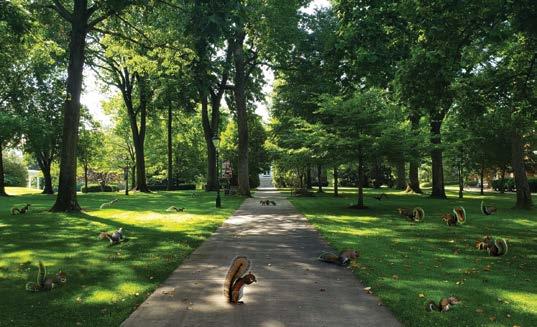

“I hope to see [higher education] find ways to incorporate this new technology, not as a substitute for learning, but as a tool to foster more learning.”
how students are using the new technology.
“I think [AI] is actually going to be very good, but I think it’s going to take us a little while to figure out how to use it,” she says. “Hollins is responsible for preparing its students for successful careers and life beyond graduation. I hope to see [higher education] find ways to incorporate this new technology, not as a substitute for learning, but as a tool to foster more learning.”
Schrementi agrees: “There’s going to be a period of adaptation. We’re just at the beginning of it, faculty and students.”
McLary shares their pragmatic optimism. “We will get to the point where
we use it sensibly and where AI is seen for its value more than a threat,” adds McLary. “If we can help students create better AI prompts, then it could be really powerful.”
“While I think faculty integration of AI on campuses and in the classroom will be a difficult shift, and ultimately change is never easy, I do think current and future students will be better prepared for the workforce with the experience of using technology that is not going away,” Abbott reflects, her eye on the world that awaits her.
Sarah Achenbach ’88 is a freelance writer living in Baltimore.
Winter 2024 25
Squirrel infestation of the Front Quad created with Adobe Photoshop.
An (un)Common Space
BY LINDSEY HULL ’23
“It’s you, our Hollins community, who make our library the heart and soul of our campus,” according to Nora Kizer Bell Provost Laura McLary, who spoke at the Wyndham Robertson Library’s grand opening celebration of The Green on October 20, 2023. “This is where everyone belongs,” she added.
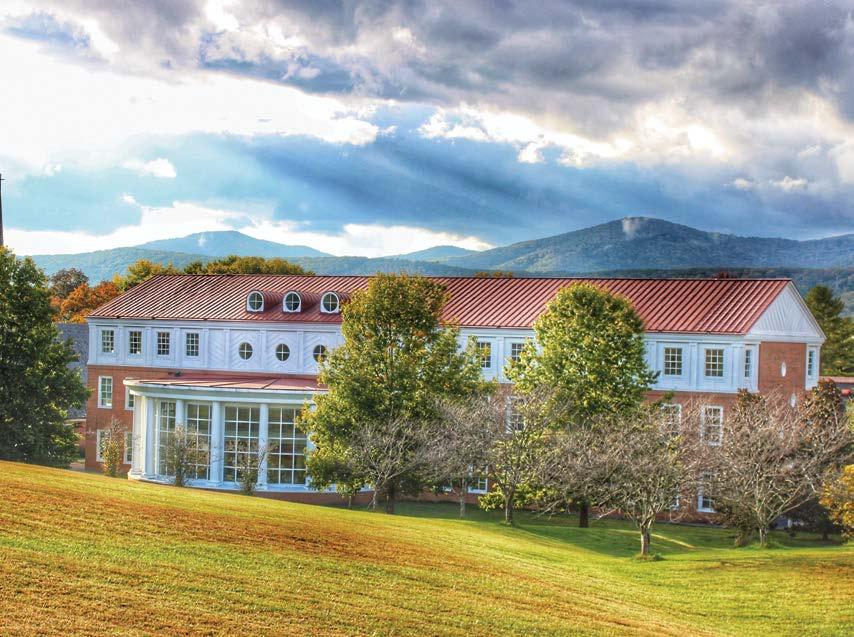
The Wyndham Robertson Library, built in 1999, underwent a substantial renovation in the last year.
“For decades, Hollins has dedicated itself to enhancing existing campus facilities as our priorities evolve. Through this project, we have an exciting opportunity to convert underutilized space into integrated, collaborative hubs that foster a holistic approach to meeting student needs.”
—Executive Vice President and Chief Operating Officer Kerry Edmonds
featured in this article by Lindsey Hull ’23
Photos
26 Hollins
President Mary Dana Hinton marked the opening of The Green on the main floor of the library by ceremoniously cutting the library’s green satin ribbon alongside Executive Vice President and Chief Operating Officer Kerry Edmonds, Provost Laura McLary, and University Librarian Luke Vilelle. The university’s Board of Trustees, faculty, staff, and students were on hand to celebrate the day.


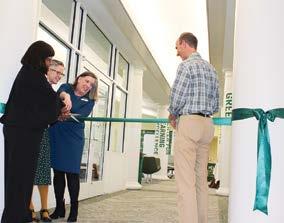
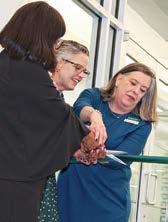
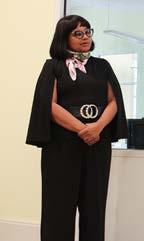

“Not only will students feel welcome in the space, but they will have the people and supports in place to connect them to what they need to be successful. And we have provided a space where those staff and supports can find new ways to collaborate and uplift our community.”
President Hinton at the ceremonial opening of The Green in October 2023
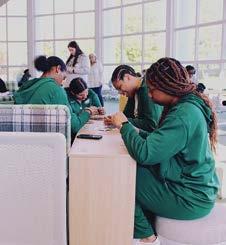
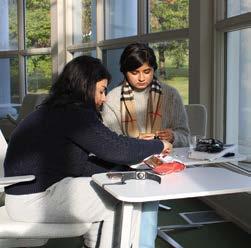
Students gather in the Frances McNulty Lewis Reading Room to craft, socialize, or work on group projects. With the addition of new seating arrangements, students are more likely to hold club meetings in this space or meet here for study groups.
Winter 2024 27
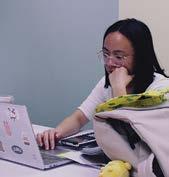
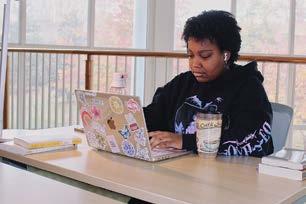
Small study rooms are available for students who want to work in quieter spaces. Tables are also scattered throughout the library’s second floor, perfect for smaller group work.


Located on the first floor, The Green provides a welcoming common space for students. This reimagined space is brighter and more inviting, with cozy seating areas and a variety of study spaces. Students say that they are more likely to spend time in this space; the bright, airy seating areas remind them of more modern colleges.

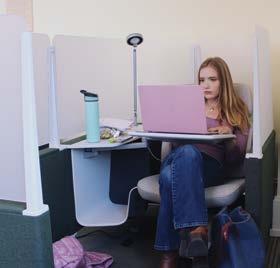
Wooden carrels may be reserved for a semester, but some students prefer newer, brighter modular seating. These modern pods are built for single study sessions.
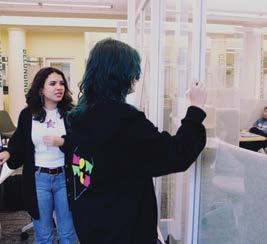
Groups may choose to study together in the student tutoring areas. These students are working on math problems while using the glass partitions as a white board. Other students gather in tutoring spaces to work on projects.

28 Hollins
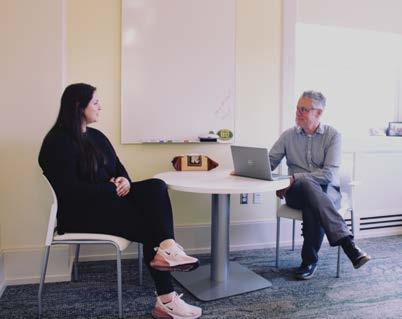
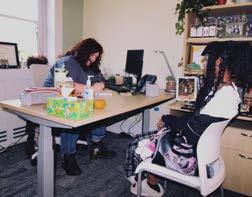
In addition to adding more modern touches, reducing shelving to improve lighting, and adding more group seating, the library has become more of a common area in general. Rather than merely a place to study or find academic resources, the library has become a space for students to find a wide range of resources. Student success services; career mentorship; the office for diversity, equity, and inclusion; and the office for global learning have all moved into the library. Classrooms are also available for faculty use.
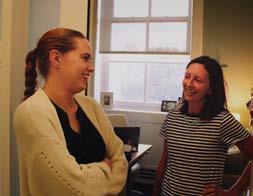

Luke Vilelle says that library traffic has noticeably increased since the renovations have been completed. “Midway through October [2023] we were up 20%. So that was a good sign to me just that you know, as people, students realize what’s here, what’s possible, we’re seeing growth there,” Vilelle said. He indicated his hope that growth in the library’s use will continue to increase. He also noted that the library has vastly expanded its space for archives, which was very much needed.

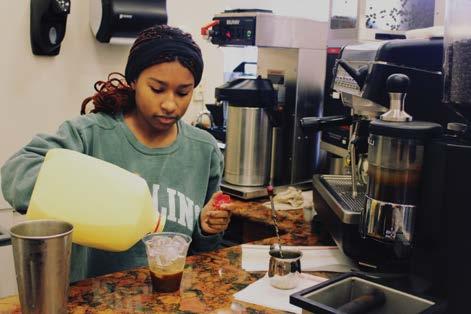
What’s next for the Wyndham Robertson Library? Greenberry’s coffee shop may soon be getting a facelift. Currently, it is open a few hours in the morning and in the evening with a limited menu. Soon, it could be refurbished with new furnishings and new artwork to match the aesthetic of the rest of the building. As for now, the morning crowd keeps barista Renaya Daniels ‘25 hopping.
Vilelle
SAVE THE DATE for Hollins Day of Giving on April 18, 2024
Last year we were able to move mountains, and this year we are looking to do so again. We need your help to reach more Hollins alumnae/i and friends! Please sign up to be a 2024 Day of Giving ambassador by scanning the QR code or emailing Noelle Cook, director of the Hollins Fund, at cooknn@hollins.edu.
See Further. Lift Higher. Move Mountains!

May 31June 2, 2024
All classes ending in 4s and 9s plus the class of 2022!
Scan the QR code to join the celebration!
Celebrate!





























 BY BILLY FAIRES
BY BILLY FAIRES











 DALL-E
DALL-E

























